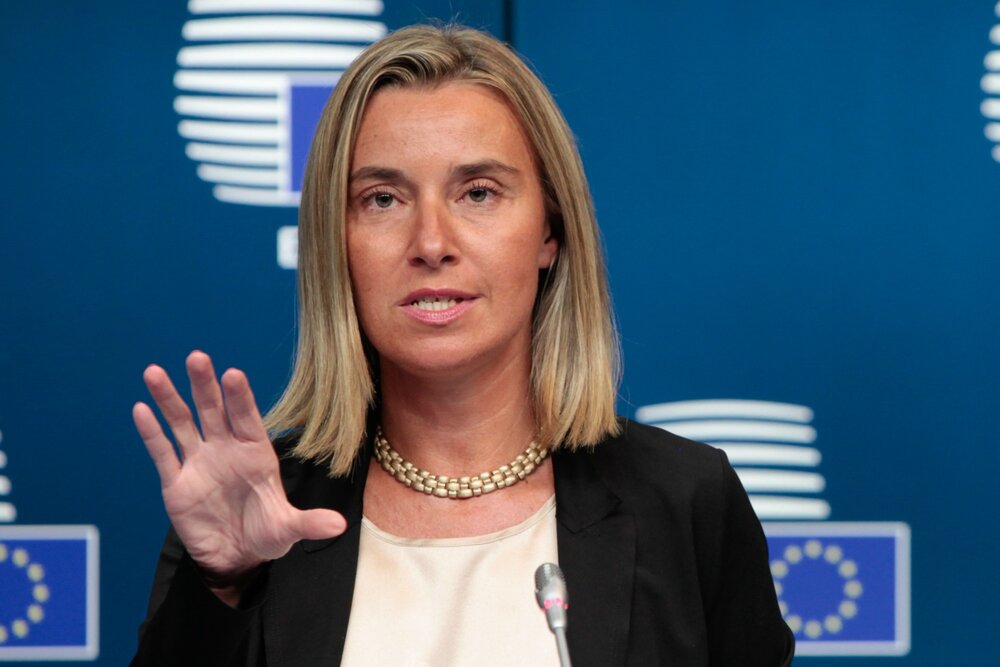Mogherini says Iran’s reducing nuclear commitments is not significant

European Union foreign policy chief Federica Mogherini said on Monday that remaining parties to the 2015 nuclear deal, known as the JCPOA, do not see Iran’s reducing its commitments as significant non-compliance.
Mogherini made the statement on Monday, less than a week after the International Atomic Energy Agency (IAEA) confirmed that Iran had passed the 3.67% uranium enrichment cap set by the nuclear deal.
“For the time being, none of the parties to the agreement has signalled their intention to invoke this article,” Reuters quoted her as saying in a news conference in Brussels. “(It) means that none of them for the moment, for the time being with the current data we have had in particular from the IAEA, that the non-compliance is considered to be significant non-compliance.”
Speaking after an EU foreign ministers meeting that was largely focused on Iran, Mogherini suggested that for now the bloc would focus on diplomatic efforts to defuse the crisis.
“The deal is not in good health, but it’s still alive,” Mogherini said. “We hope and we invite Iran to reverse these steps and go back to full compliance with the agreement,” she said, pointing out that they were all reversible.
Prior to the meeting, Mogherini said, “Together with all the member states and our international partners, how we preserve the nuclear deal with Iran and put in place all the measures so that Iran can go back to full compliance, as it has been until a few weeks… days ago.”
France, Germany, and the UK, the three parties to the JCPOA, issued a statement on Sunday reiterating their support for the deal.
British Foreign Minister Jeremy Hunt said that the nuclear deal is not dead “yet”.
According to the BBC, he said that there is a “small window” to save the deal.
Dutch Foreign Minister Stef Blok also said that “it is still not too late” to save the JCPOA.
French Foreign Minister Jean-Yves Le Drian said that Europe has to remain united in trying to preserve the nuclear deal.
“The Europeans have to stay united on this issue,” Reuters quoted Le Drian as saying.
Margot Wallstrom, Sweden’s foreign minister, said, “We will continue to talk to the Americans as well about how counterproductive this is and we’re not helped by further escalation of the sort of conflict between the U.S. and Iran.”
According to TASS, German Minister of State for Europe Michael Roth said, “Violating the nuclear agreement is completely unacceptable for us. As the European Union, we should speak with one voice on the matter.”
Finnish Foreign Ministry issued a statement on Sunday expressing support for preserving the JCPOA.
Foreign Ministry spokesman Abbas Mousavi said on Monday that Iran expects European partners to the nuclear deal to take practical actions to implement the deal.
“Iran expects the European partners to the JCPOA to take practical decision and actions which are effective and responsible in the procedure of implementing the JCPOA,” he stated.
On May 8, exactly one year after the U.S. withdrew from the multi-nation nuclear agreement, Iran announced a partial withdrawal from some aspects of the pact, saying that the country would no longer adhere to some of the limits on its nuclear activities. It also threatened to step up uranium enrichment if an agreement is not made within 60 days to protect it from the sanctions’ effects.
In follow-up to that deadline, on July 7 Iran announced that it has started enriching uranium to a higher purity than the 3.67% as the Europeans missed the 60-day deadline to devise a concrete mechanism to protect the country from the U.S. sanctions.
However, Iran has said if the remaining parties offset sanctions it will reverse its decisions.
NA/PA
